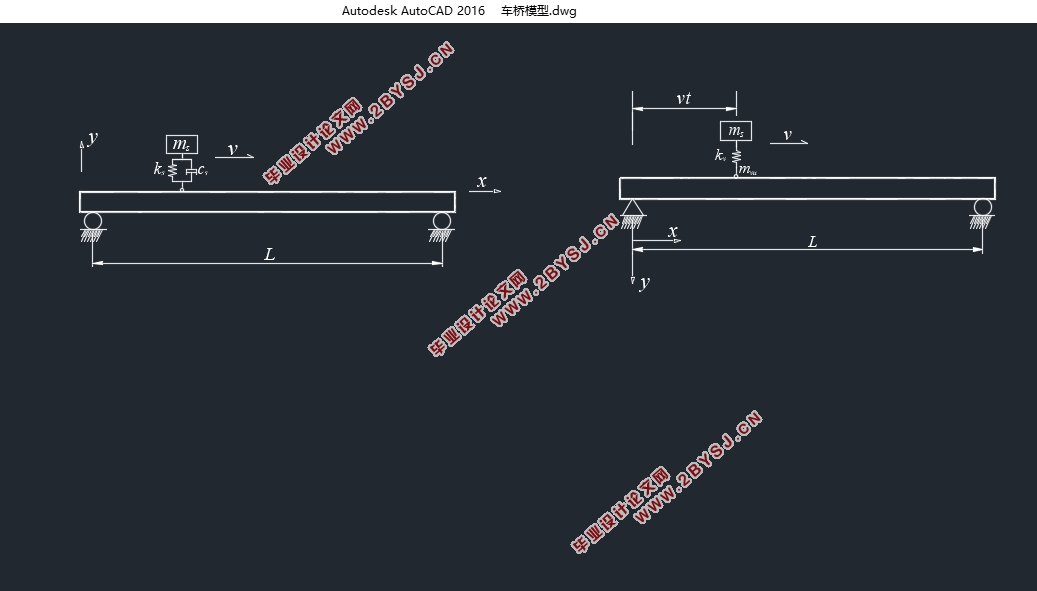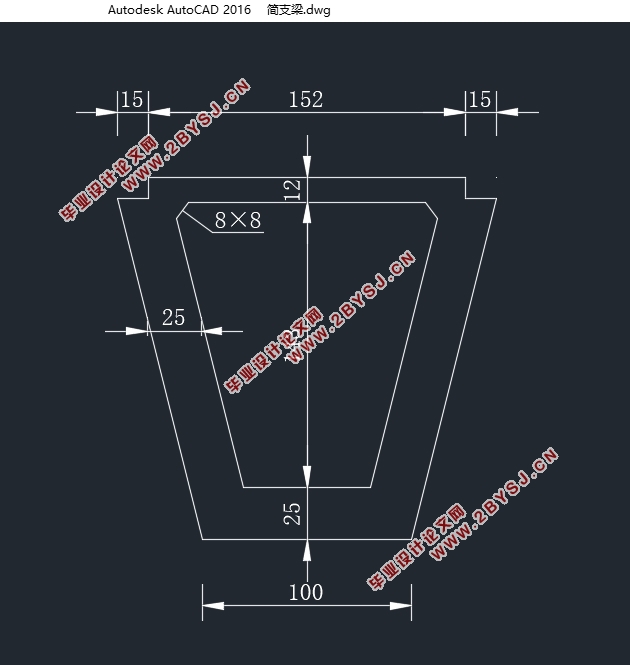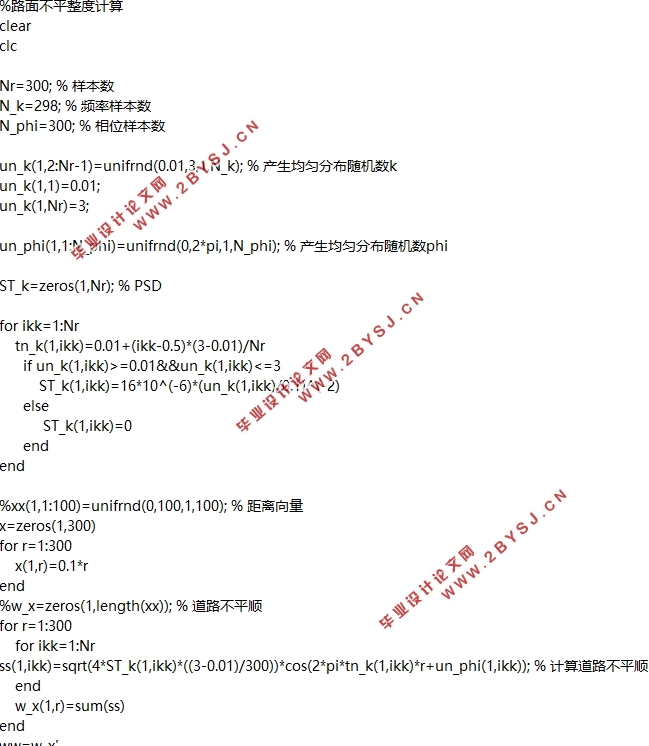预应力作用对车桥耦合振动影响分析(含CAD图,ANSYS,MATLAB)
无需注册登录,支付后按照提示操作即可获取该资料.
预应力作用对车桥耦合振动影响分析(含CAD图,ANSYS,MATLAB)(任务书,开题报告,外文翻译,论文说明书26000字,CAD图7张,ANSYS命令流,MATLAB)
摘 要
汽车在桥面行驶时,桥梁振动及桥面竖向不平整激励会引起车辆的振动,反过来,车辆振动产生的惯性力及车辆自重荷载会使桥梁结构产生一定的振动,严重时车桥共振将影响桥梁的安全性能,甚至可能造成桥梁结构失效并最终垮塌。随着公路网的日益加密,预应力梁桥由于在跨径及承载能力等结构性能方面优于普通混凝土梁桥,现已成为公路运输系统的重要组成部分。研究预应力作用对车桥耦合振动的影响将为公路预应力桥梁设计和养护提供一定参考意义。
本文以某座实际的等截面简支箱梁桥为工程背景,考虑桥面不平整的影响进行车桥耦合振动分析与研究。首先基于大型有限元分析软件ANSYS建立等截面简支箱梁力学模型。为研究预应力作用对混凝土梁桥车桥耦合振动的影响,建立普通混凝土梁桥模型和预应力混凝土梁桥模型作为对照。然后,建立单自由度车辆模型及四自由度车辆模型对桥梁施加车辆荷载;考虑路面不平整度的激励,利用MATLAB数学分析软件随机生成路面不平整度数据,由ANSYS调用作为静力荷载施加在桥梁和车辆模型上。最后,基于“生死单元法”对车桥耦合振动进行瞬态分析,并对桥梁跨中位移响应和冲击系数进行数值模拟。综合本文研究,可以得到以下结论:
(1) BEAM188单元和SOLID95单元建立的梁桥模型均可以实现“生死单元法”完成车桥耦合分析,与BEAM188单元相比,SOLID95单元对箱梁畸变和剪力滞效应以及桥面板的局部振动效应的模拟效果更优;
(2) 在桥梁设计速度范围内,车辆行驶速度达到车桥共振速度之前,速度越快,车辆产生的冲击效应增大,相应的桥梁跨中挠度、纵向应力等均增大;
(3) 预应力作用对桥梁跨中挠度和冲击系数大小的影响显著。
关键词:预应力梁桥;桥面平顺性;车桥耦合振动;结构响应;冲击系数
Abstract
While the vehicle is driving on the bridge, vibration of the bridge and the unevenness of its surface will inevitably cause the vibration of the vehicle. On the other hand, the vehicle’s vibration as well as the inertial force generated by tires’ up and down bounce also affects the vibration of the bridge at the same time, the safety of bridge is weakened and even the structural may fail and eventually collapse when the vehicle-bridge coupling vibration has strong effect. With the constant improvement of highway network, because of great structural performance and superior spanning capacity compared with ordinary concrete bridge structure, modern pre-stressed bridge structure has played an important role in the transportation system. Thus, studying the effect of pre-stressing force on the vehicle-bridge coupling vibration will provide some references for the design and maintenance of pre-stressed concrete bridges.
In this paper, based on the engineering background of a cross-section simply supported beam bridge, the analysis and research on the vehicle-bridge coupling vibration under the consideration of surface evenness are carried out. First of all, on the basis of the finite element analysis software ANSYS, the bridge mechanical model of the simply-supported beam with uniform box section was established. In order to study the influence of pre-stressing force on the coupling vibration of concrete beam bridge, ordinary concrete beam bridge model and pre-stressed concrete beam bridge model were built respectively. Afterwards, one vehicle model with one degree-of-freedom and the other with four degrees-of-freedom were established to simulate vehicle loads; Considering the effect of the surface unevenness, the surface evenness data was randomly generated by the MATLAB software, and transformed as the static load to impose on the bridge and vehicle model. At last, the transient analysis of the vehicle-bridge coupling vibration was performed based on the “birth and death unit method”, and numerical simulation on the bridge mid-span displacement response and impact factor were computed. Based on comprehensive study of the paper, the conclusions are as follows:
(1) Both BEAM188 unit and SOLID95 unit can be used to simulate the vehicle-bridge vibration based on the “birth and death unit method”. Compared with BEAM188 unit, SOLID95 unit can better simulate the box beam distortion and shear lag effect as well as the vibration effect of bridge panel;
(2) In the bridge design speed range, before the vehicle reaches the resonance speed of vehicle-bridge vibration, an increase in the speed of the vehicle will increase the impact effect, and the corresponding mid-span deflection of bridge, longitudinal stress, etc. significantly;
(3) Pre-stressing force in bridge can have great effect on the bridge mid-span deflection and the impact factor caused by vehicle-bridge coupling vibration.
Key Words:pre-stressed beam bridge;surface unevenness; vehicle-bridge coupling vibration; structureresponse; impact factor
本文研究内容
本文以跨径长30m,箱型截面形式的简支梁桥为工程背景,根据“规范”给定的桥梁结构尺寸和材料特性参数等设计资料,运用ANSYS分别利用BEAM188单元和SOLID95单元建立等截面混凝土梁桥有限元模型;运用公路桥梁车桥耦合振动相关理论知识,参考“规范”所给出车辆的模型参数建立车辆模型。利用MATLAB软件对桥面的不平整度数值进行计算模拟;将不平整度作为静力荷载,通过ANSYS调用对桥梁施加时程桥面不平整度荷载;利用“生死单元法”分别求解在不同单元类型下,分别考虑预应力在车桥耦合振动是否作用对桥梁跨中位移响应、冲击系数等结构响应的影响;最后控制车辆行驶速度、行车数目和车辆模型自由度个数分别进行简支箱梁桥在车桥耦合振动作用下的动力响应分析,并给出预应力作用对简支梁桥车桥耦合振动影响的分析和结论






目录
第1章 绪论 1
1.1 公路车桥耦合振动问题的提出 1
1.2 车桥耦合振动研究现状 1
1.2.1 国外车桥耦合振动研究现状 1
1.2.2 国内车桥耦合振动研究现状 2
1.3 预应力梁桥车桥耦合振动研究意义 3
1.4 本文研究内容 5
1.5 本章小结 5
第2章 车桥振动响应分析方法 6
2.1 桥梁模型的建立 6
2.1.1 结构刚度矩阵 6
2.1.2 结构质量矩阵 7
2.1.3 结构阻尼矩阵 7
2.2 车辆模型的建立 8
2.2.1 单轮车辆模型原理 9
2.2.2 双轮车辆模型原理 10
2.3 车桥耦合振动方程 11
2.3.1 简支梁桥的固有振动 12
2.3.2 简支梁车桥耦合振动 13
2.4车桥耦合振动数值计算方法 16
2.4.1 中心差分法 16
2.4.2 Wilson—θ法 16
2.4.3 Newmark—β法 17
2.5 本章小结 17
第3章 ANSYS模型的建立 19
3.1 工程概述 19
3.2 钢筋混凝土梁模型的建立 20
3.2.1 主梁力学模型 20
3.2.2 预应力钢筋模型 21
3.3 车辆模型的建立 22
3.3.1 单轮单自由度车辆模型 23
3.3.2 双轮四自由度车辆模型 23
3.3.3 车桥有限元建模流程 24
3.4 ANSYS模型验证 25
3.4.1 静力分析模型验证 25
3.4.2 模态分析模型验证 26
3.5 本章小结 27
第4章 生死单元法车桥耦合振动求解 28
4.1生死单元法的基本原理 28
4.2 桥面不平整度荷载计算与施加 28
4.2.1 桥面不平整度数值模拟 30
4.2.2 三角级数法不平整度数值计算 33
4.2.3 桥面不平整度荷载在ANSYS模型中的施加分析 36
4.3 车桥耦合振动求解 37
4.3.1 钢筋混凝土单箱简支梁数值模拟 37
4.3.2 钢筋混凝土双箱简支梁数值模拟 40
4.4 本章小结 41
第5章 梁桥车桥振动数值分析 42
5.1 时域内主梁跨中位移影响特性分析 42
5.1.1 车速控制特性分析 42
5.1.2 双车行驶特性分析 43
5.1.3 复杂车辆模型特性分析 46
5.2 本章小结 47
第6章 结论与展望 48
6.1 结论 48
6.2车桥耦合分析的研究展望 48
主要参考文献 50
致 谢 51
